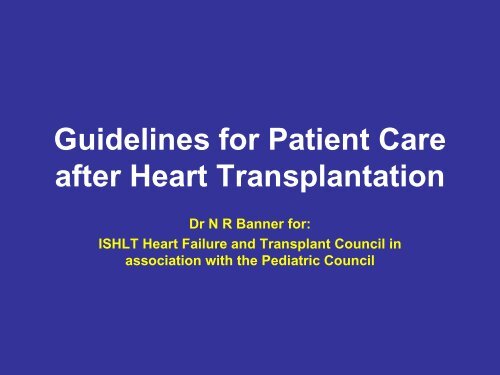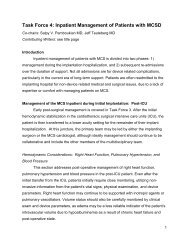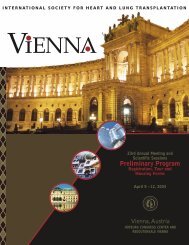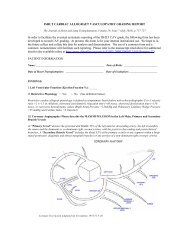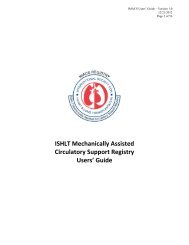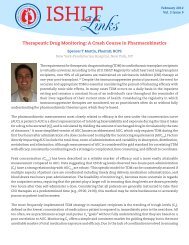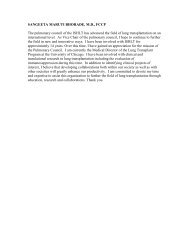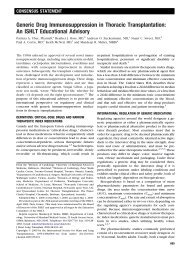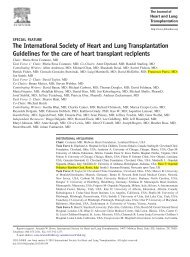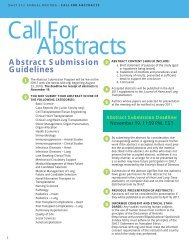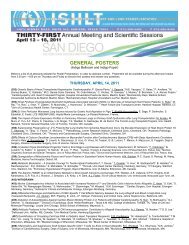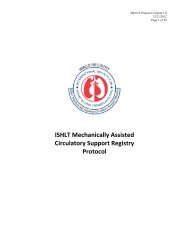Guidelines for Patient Care after Heart Transplantation
Guidelines for Patient Care after Heart Transplantation
Guidelines for Patient Care after Heart Transplantation
Create successful ePaper yourself
Turn your PDF publications into a flip-book with our unique Google optimized e-Paper software.
<strong>Guidelines</strong> <strong>for</strong> <strong>Patient</strong> <strong>Care</strong><br />
<strong>after</strong> <strong>Heart</strong> <strong>Transplantation</strong><br />
Dr N R Banner <strong>for</strong>:<br />
ISHLT <strong>Heart</strong> Failure and Transplant Council in<br />
association with the Pediatric Council
The process<br />
• Proposal b<br />
• Topic planning b<br />
• ISHLT Board approval b<br />
• Topic leads b<br />
• Volunteers<br />
• Topic groups<br />
• Writing process<br />
– Assignments<br />
– Email submissions<br />
– Conference calls<br />
– Requests <strong>for</strong> revision<br />
– Topic coordination<br />
• Final conference be<strong>for</strong>e 2009 Annual Meeting (Paris)
TOPIC 1: Early postoperative care<br />
Leads:<br />
• Maria Rosa Costanzo<br />
• Randall Starling<br />
• Robert Bonser<br />
•TBC
Scope of topic 1<br />
• Continuous hemodynamic monitoring and availability of transesophageal echo<br />
– early recognition of the complications that may occur <strong>after</strong> heart<br />
transplantation e.g. primary graft failure and right ventricular failure, either as a<br />
manifestation of PGF or secondary to an increased PVR.<br />
• Donor and operative factors that may impact of post-operative management<br />
• Pharmacological Therapies in the Early Postoperative Period:<br />
– Inotropes.<br />
– Role of nitric oxide<br />
– Management of Volume Status and Hemodynamics<br />
– Metabolic management (Acidosis, glycemic management),<br />
• Non-Pharmacological Therapies in the Early Postoperative Period<br />
– Pacing.<br />
– Crucial role of renal function as indication of an adequate circulation,<br />
indications <strong>for</strong> the use of hemofiltration and other RRT.<br />
– Use of VADs to manage PGF<br />
• Documentation and communication within the multidisciplinary team.<br />
• Role of therapeutic targets<br />
• The use of ECMO to treat primary graft failure in pediatric heart transplantation.<br />
• Other ‘surgical’ complications, hemorrhage, tamponade<br />
• Coagulopathy<br />
• Cross match results and hyperacute rejection (HLA and ABO incompatibility)<br />
• Management of ABO ‘incompatible’ pediatric transplants (inc. blood products)
Topic 2: Immunosuppression,<br />
rejection and infection<br />
Leads:<br />
• Nicholas Banner<br />
• David Taylor<br />
• Bruno Meiser<br />
• Steve Webber
Scope of Topic 2<br />
• Mechanisms and clinical manifestations of acute rejection – cross reference<br />
ISHLT report on diagnosis.<br />
• Role of the endomyocardial biopsy in the diagnosis of acute rejection<br />
(clinically indicated and routine surveillance).- mention both ISHLT grading<br />
systems<br />
• Pediatric considerations related to endomyocardial biopsy<br />
• Current status of non-invasive methods of screening <strong>for</strong> rejection. Assessment<br />
of emerging methods <strong>for</strong> the diagnosis of rejection (sensitivity, specificity,<br />
etc…)<br />
• Pharmacology of immunosuppressive agents.<br />
• Pharmacokinetics of immunosuppressive agents and relevant drug interactions<br />
– inc. special situations e.g. HIV infection<br />
• Principles of immunosuppression and recommended regimens based on<br />
in<strong>for</strong>mation from clinical trials.<br />
• What is the role of induction therapy?<br />
• Role of statins as adjunctive immunosuppressive agents and as prophylaxis<br />
against CAV.<br />
• Management of acute rejection (ACR and AMR).<br />
• Late acute rejection.<br />
• Prophylaxis against infection e.g. CMV, pneumocystis and toxoplasmosis.<br />
• Diagnosis and management of infections (nosocomial, community,<br />
opportunistic, chronic).
Topic 3: General care and<br />
management of other complications<br />
Topic leads<br />
• Edoardo Gronda<br />
• Barry Rayburn<br />
• Mandeep Mehra<br />
• Michael Burch
Scope of Topic 3<br />
• Approaches to drug withdrawal/dose minimization/sequential therapies to minimize toxicity<br />
• Management of specific toxicities e.g. nephrotoxicity and neurotoxicity.<br />
• Cardiac allograft vasculopathy (angiography, IVUS, non invasive testing, lipids and risk<br />
factor modification, alternative immunosuppression strategies).<br />
• Malignancy (skin, PTLD, other – role of immunosuppression per se and effects of specific<br />
agents).<br />
• Chronic kidney disease.- investigation and management – when to involve the nephrologist<br />
• Post-transplant diabetes mellitus.<br />
• Other Complications of Chronic Immunosuppression (<strong>for</strong> example myopathy from chronic<br />
steroid therapy) – effect of steroids on growth in children<br />
• Post-transplant hypertension.<br />
• Prophylaxis against steroid induced bone disease<br />
• Approach to patients who are already on ‘obsolete’ immunosuppressive agents such as<br />
azathioprine.<br />
• Sexual health (including erectile dysfunction and pregnancy).<br />
• Recommendations <strong>for</strong> rehabilitation and Prescription <strong>for</strong> Exercise<br />
• Management of intercurrent surgery in the heart transplant patient (pre-operative<br />
assessment, handling immunosuppression, antibiotic prophylaxis, steroid dependence).<br />
• Return to work, occupational restrictions<br />
• Licensing <strong>for</strong> driving a motor vehicle (private and occupational)<br />
• When should prophylaxis against infective endocarditis be used <strong>for</strong> dental and other<br />
procedures?<br />
• Indications and special considerations <strong>for</strong> re-do <strong>Heart</strong> <strong>Transplantation</strong>.<br />
• Recommendation of frequency of routine tests and clinic visits<br />
• Psychological issues particularly related to adherence to drug therapy.<br />
• Managing the transition from pediatric to adult care<br />
• Principles of shared care with referring cardiologist or family physician
Introductory article<br />
• Easily readable summary of the detailed<br />
in<strong>for</strong>mation contained in the following articles<br />
written by the lead authors <strong>for</strong> the 3 topics.<br />
• Emphasis of summary tables, algorithms and<br />
charts<br />
• No references needed (evidence in subsequent<br />
articles)<br />
• Usable by all health care professionals<br />
• Suitable to adapt as a pocket guide (could be<br />
reprinted using money from a sponsor)
Who should volunteer?<br />
• Knowledge and expertise<br />
• Motivation<br />
• Commitment to 1-year process<br />
• Time available<br />
To volunteer email: n.banner@rbht.nhs.uk BEFORE April 21 2008<br />
• Task <strong>for</strong>ce <strong>for</strong> each topic will be selected by<br />
topic leads on basis of the contribution that each<br />
individual can make


